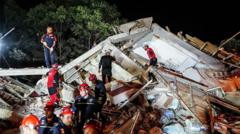The arrest of photojournalist Yasin Akgul and other reporters covering protests linked to the arrest of Istanbul's opposition mayor has highlighted increasing tensions and fears over media freedom and democracy in Turkey.
Journalist Arrests in Turkey Prompt Widespread Concerns for Democracy

Journalist Arrests in Turkey Prompt Widespread Concerns for Democracy
A string of arrests targeting journalists amid ongoing anti-government protests in Turkey is raising alarm bells about the nation's democratic integrity.
On March 23, in the early hours of the morning, Istanbul police stormed the home of Yasin Akgul, a photojournalist for AFP, while his children were still asleep. Just hours earlier, he had captured significant anti-government demonstrations linked to the arrest of Istanbul’s mayor, Ekrem Imamoglu, a key opposition figure against President Recep Tayyip Erdogan. Akgul, who has extensive experience in conflict areas, described the moment of his arrest as terrifying, particularly because it unfolded in his family home.
"I went to the door and saw there was a lot of police," Akgul recalled, detailing how they presented an arrest order without any explanations. He described a pervasive sense of fear ensuing in his household. Six other journalists were arrested during a series of dawn raids following the protests, which erupted in response to allegations of corruption against Imamoglu that his supporters claim are politically motivated.
The Turkish authorities had prohibited the protests, yet the demonstrations continued unabated, fueled by public outrage. Akgul is now facing accusations of participating in "illegal rallies" as authorities appear intent on intimidating journalists and stifling any portrayal of unrest on the ground. His striking images have garnered international attention, yet they come at a significant personal cost.
"Don't shoot, don't speak, don't film," Akgul warned, underscoring the chilling effect on press freedom that these arrests are evidently intended to produce within Turkey’s media landscape. Since his arrest, many freelance journalists have opted to remain silent, fearing for their safety.
The political landscape remains tense, with Erdogan asserting control, labeling protests as "street terrorism," and predicting that public dissent will diminish. Akgul reaffirmed his commitment to journalism despite the risks, underscoring that these events could signal a concerning trend for Turkey’s democracy. "Someone needs to do this job," he expressed, hoping to continue documenting the reality of the situation.
As protests continue, with varying participation numbers and public support for the opposition, analysts fear a growing authoritarian grip over civil liberties. Amid a backdrop of increasing arrests—about 2,000 in a fortnight as reported by the interior ministry—future protests are likely to be met with continued governmental suppression, raising serious questions about the future state of democracy in the region.


















